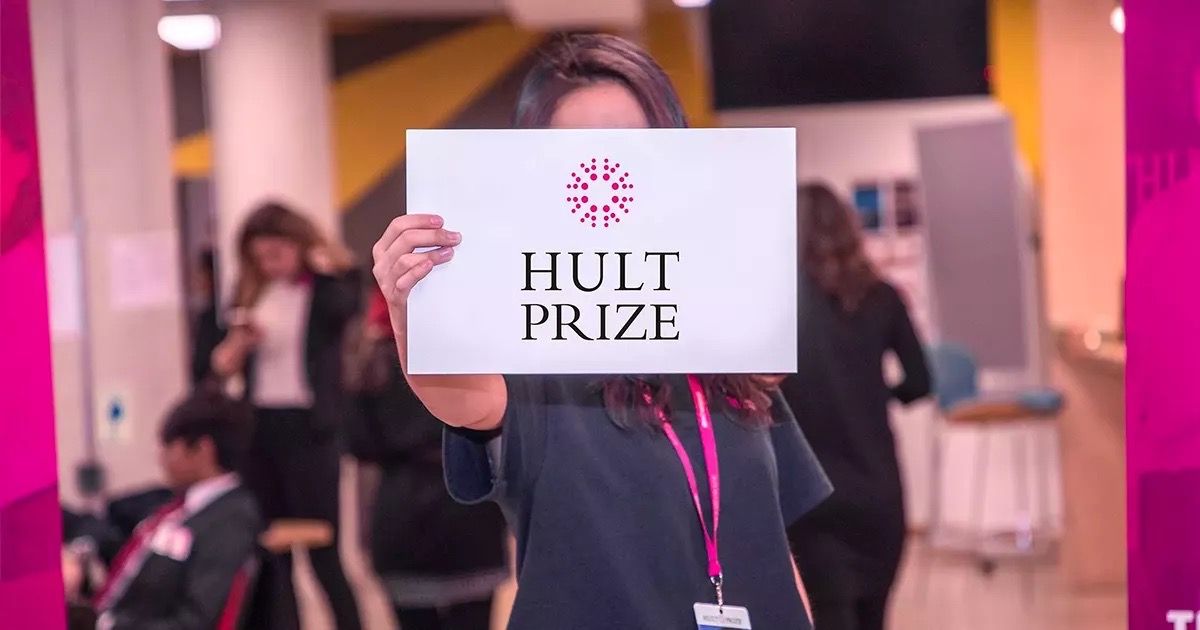All Eyes on the Hult Prize
At Hult, we believe that business has the power and the responsibility to change lives for the better. The Hult Prize is a worldwide student competition that challenges university teams to solve the most pressing global issues with viable business ideas.
PLAY VIDEO

How will you change the world?
The Hult Prize is the world’s largest student social entrepreneurship competition. Run in partnership with the United Nations, student teams from universities from across the world compete to solve a pressing social issue by developing a scalable, sustainable social enterprise. Finalists pitch to a panel of esteemed judges, global business leaders, thought leaders, and changemakers to win 1M USD and launch their enterprise. Past judges include former US President Bill Clinton, former Australian Prime Minister Julia Gillard, and Nobel Peace Prize Winner Muhammad Yunus. Past challenges include food security, access to clean water, and affordable education.
PLAY VIDEO

Doing business to do good
Behind the Hult Prize is Hult International Business School. We see the Hult Prize as a vehicle for making our educational philosophy freely available to all students, wherever they’re studying. Our students learn that business and social impact go hand-in-hand and Hult's experiential learning approach centers around putting theory into practice. We support every Hult student who wants to take part in this life-changing experience and take advantage of the opportunity to give a global platform to their business ideas that will directly impact society.
Named by Time magazine as one of the “top five ideas that are changing the world for the better” and dubbed the “Nobel Prize for students,” the Hult Prize is a key milestone on the journey of any aspiring social entrepreneur. From one Hult student’s idea to a global movement—the Hult Prize seeks to solve the world’s biggest challenges through social entrepreneurship.

Past challenges and winners
Each of these amazing teams stood out amongst thousands of their peers to be named winners of the Hult Prize.
Their work is a testament to the power of youth to make the world a better place. We are so proud of them and cannot wait to see the impact they continue to make in the world.
2023
Redesigning fashion
Banofi Leather, 2023 Hult Prize Winner, takes banana crop waste and converts it into plant-based leather that is vegan, sustainable and cruelty-free.
2022
Getting the world back to work
EcoBana, 2022 Hult Prize Winner from St. Paul's University in Limuru, Kenya, is a social enterprise that is getting people back to work, with an aim to stop plastic manufacturing in sanitary towels and to manufacture biodegradable sanitary pads to end period poverty.
2021
Rethinking food systems
In 2021, the Hult Prize challenged students to rethink our broken food systems by transforming food into a vehicle for change. Seven teams below were selected as 2021 Hult Prize Winners.
2020
Environment
The Hult Prize challenged students to build businesses that improve the environment with every sale completed, dollar earned, and decision made. Eleven teams were selected as 2020 Hult Prize Winners.
2019
Global youth unemployment
Team Rutopia, from Tec de Monterrey, won the challenge with their plans to support youth in indigenous communities to become eco-tourism guides and connect tourists with local communities.
2018
Harnessing the power of energy
SunRice from University College London won with their idea of a rice drying service that aims to reduce rice wastage and empower rice farmers in Southeast Asia.
2017
Refugees: Reawakening human potential
Roshni Rides from Rutgers University won with their idea of a solar-powered rickshaw service for refugee camps and informal settlements.
2016
Crowded urban spaces
BuuPass from Earlham College won with their company that aims to help people at least double their income through improved commuting.
2015
Early childhood education
IMPCT from National Chengchi University won with a business idea to build children's education franchises in urban slums, run by local caregivers.
2014
Healthcare: Non-communicable disease in the urban slum
NanoHealth from Indian School of Business won with their "Doc-in-a-Box" diagnostic tool that measures basic indicators including blood sugar and pressure levels.
2013
Global food crisis
Aspire Food Group from McGill University won with their revolutionary model of producing, treating, and promoting the human consumption of insects.
2012
Affordable energy
Sunny Monkey from New York University Abu Dhabi won the competition by replacing kerosene and paraffin with affordable, portable solar lights.
2011
Global water crisis
m.Paani from the University of Cambridge collaborated with water.org to devise a winning loyalty scheme that allowed users to pool points from telecom partners to fund clean water projects.
2010
Education
The Hult Prize partnered with One Laptop Per Child to connect 20 million children around the world and provide them with educational opportunities.